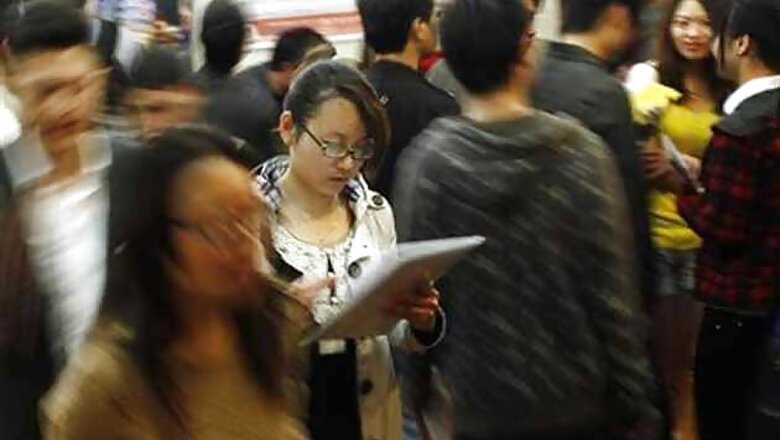
views
Beijing: The success or failure of China's efforts to revamp its giant economy may rest with workers like Hu Zhao and Deng Jindong. They were both at a job fair in Beijing this week. Hu, a 30-year-old former factory worker, was looking for a higher paid office job. Deng, a sales manager with Ping An Insurance Co, was trying to hire sales people to sell financial products.
They represent two ends of a massive shift in the world's second-biggest economy being engineered by President Xi Jinping and Premier Li Keqiang, who are trying to manage a slowdown in growth to reduce a reliance on the investment that has made the country the factory to the world.
China's leaders hope to orchestrate the shift without creating a surge in unemployment by building up the services sector to take up the economic slack as factories close down.
Failure to keep Chinese in jobs could threaten the social stability and economic prosperity that the Communist Party says justifies its one-party rule.
"The persistent weakness in the manufacturing sector will have a bigger impact on jobs," said Lian Ping, chief economist at Bank of Communications in Shanghai. "There is no room for complacency."
As Beijing shifts the economy away from manufacturing, the growth that has been the envy of the world for decades is slowing down.
In fact, it has eased in nine of the last 10 quarters. That included in April to June, when GDP rose by 7.5 per cent from a year earlier, high by developed-economy standards but China's second-weakest expansion since the global financial crisis.
The government has shown little concern about the slowdown and has been vague about the growth level it sees as necessary to prevent a serious rise in unemployment. Economists estimate that level to be at least 7 per cent.
But they said joblessness, rather than growth, will be the major factor driving policy. Premier Li has talked about the government safeguarding the lower limits of growth and employment, although he has not specified what the limits are.
So if jobless numbers surge, the government will take its foot off the economic restructuring pedal and step in with fresh stimulus to boost growth, analysts say.
The evidence so far suggests that Beijing has little to worry about.
Wang Yuehu, a manager at the Beijing jobs fair organised by the city government, said more people were getting employment in the services sector as manufacturing slowed down.
"Overall, the job market is stable," he said, echoing comments in recent weeks from other government officials.
Services, which took over manufacturing as the biggest economic sector in 2007, is also the biggest employer, providing 36 per cent of the country's jobs compared with 30 per cent in factories.
Data on sector growth is not readily available, but China's official purchasing managers' index suggests services are growing faster than manufacturing. The services measure has hovered between 53.9 and 56.7 in the past 12 months, - comfortably above the 50 mark that divides growth from contraction - while manufacturing has fluctuated between 49.2 and 50.9.
China added 7.25 million jobs in the first half of this year, a rise of 310,000 from a year earlier, the ministry of human resources and social security said. The ministry also says there were 1.07 job vacancies for each applicant in the second quarter.
Vacancies in manufacturing and construction both fell in the latest quarter, while jobs in computer services, software and property all rose.
The official jobless rate is 4.1 pct per cent. But it is widely criticised by private-sector economists as an unreliable gauge largely because it has hardly changed for years, even during downturns.
What worries Beijing is a sudden drop in economic growth that would leave millions of factory workers without jobs.
The collapse of China's exports during the 2008/2009 global financial crisis left some 20 million migrant workers unemployed within months and prompted Beijing to roll out a 4 trillion-yuan stimulus package that has left a debt hangover, which the country is still trying to digest.
Xi and Li hope they will not have to repeat that. They are betting that a demographic shift in China's 1.3 billion population in recent years, which means the total workforce of more than 900 million is already shrinking, will help support the shift in the years ahead.
Still, manufacturing job losses look inevitable as Beijing tackles the worst polluters and loss-making companies in sectors gripped by overcapacity as part of its economic reforms.
The official PMI factory survey indicates manufacturing employment has been falling since the middle of 2012.
Reports earlier this month said China's largest private shipbuilder, China Rongsheng Heavy Industries Group Holdings (1101.HK), a victim of its own rapid expansion and a shipbuilding downturn, had cut 8,000 jobs.
He Keng, a former lawmaker, said the sluggish growth of real urban disposable income - at 6.5 per cent in the first half from a year earlier compared to the 7.6 per cent GDP growth - offered fresh evidence of weakness of the job market.
"That shows job creation is not sufficient and the job market is worse than described by official figures," he told reporters on the sidelines of an economic forum this week.
Another worrying sign is that China is also set to produce a record 7 million college graduates in 2013 but the proportion that has already secured job contracts is the lowest in years, labour ministry figures show.
The government has told state-owned firms to hire more graduates and has provided subsidies to help them start new businesses.
The key to the service sector's ability to take up the economic slack of a slowdown in manufacturing will be how quickly the government opens up the likes of financial services, insurance and logistics to private investors, said Minggao Shen, an economist at Citigroup in Hong Kong.
But even if the services sector expands steadily, many manufacturing workers may find they are not deemed qualified for the new jobs, a concern expressed by Hu at the Beijing jobs fair.
"I'm not sure if I can get a suitable job here," said the former factory worker. "I don't have any college degree."



















Comments
0 comment